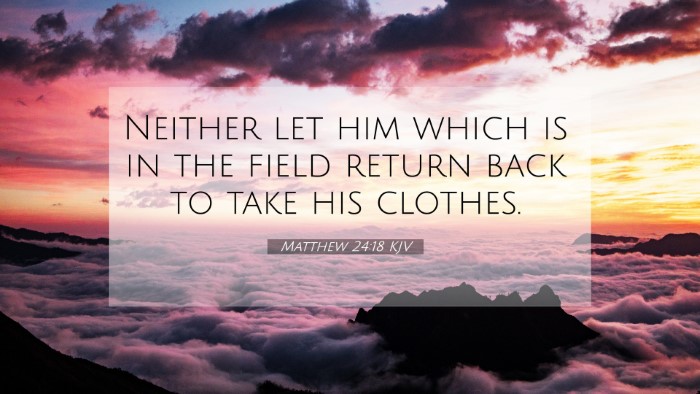Understanding Matthew 24:18: A Comprehensive Analysis
Matthew 24:18 reads: "And let him who is in the field not turn back to get his clothes." This verse, part of Jesus' Olivet Discourse, carries significant implications for understanding urgency and preparedness in the face of tribulation.
Contextual Background
This verse is situated within a broader prophetic framework where Jesus speaks of the tribulations that will precede His second coming. He emphasizes the need for readiness and decisiveness—a theme echoed throughout scripture.
Insights from Public Domain Commentaries
-
Matthew Henry:
Henry describes this instruction as a call for believers to not be encumbered by earthly possessions during perilous times. The urgency reflects the necessity to focus on spiritual safety over physical comforts.
-
Albert Barnes:
Barnes emphasizes that Jesus warns against the distraction of returning for material goods when the time for escape is urgent. This notion underscores the prioritization of spiritual readiness above worldly concerns.
-
Adam Clarke:
Clarke notes that this verse illustrates the need for immediate action in the face of impending danger. He makes parallels to other instances in Scripture where immediate obedience is critical.
Thematic Connections & Cross-Referencing
Matthew 24:18 connects thematically with several other Bible verses that also address preparedness, urgency, and the peril of distraction:
- Luke 17:31: "In that day, he who is on the housetop, and his goods are in the house, let him not come down to take them away." This parallel emphasizes readiness and immediacy.
- Romans 13:12: "The night is far spent, the day is at hand; therefore let us cast off the works of darkness, and let us put on the armor of light." Urgency in spiritual readiness is a common theme.
- Revelation 3:11: "Behold, I am coming quickly! Hold fast what you have, that no one may take your crown." Here, the call to hold fast illustrates the need for vigilance.
- 1 Thessalonians 5:2-3: "For you yourselves know perfectly that the day of the Lord so comes as a thief in the night." This metaphor of suddenness echoes the sentiments in Matthew 24:18.
- Hebrews 12:1: "Therefore we also, since we are surrounded by so great a cloud of witnesses, let us lay aside every weight, and the sin which so easily ensnares us." Focus on spiritual race preparation aligns with this urgency.
- Mark 13:16: "And let him who is in the field not go back to get his clothes." Mark's account reinforces Matthew's emphasis on immediate action during distress.
- Philippians 3:13-14: "Forgetting those things which are behind and reaching forward to those things which are ahead, I press toward the goal." This statement stresses the importance of forward-looking, decisive action.
Application in Modern Faith Practice
In light of Matthew 24:18, modern Christians are encouraged to live a life that prioritizes spiritual matters over worldly distractions. The urgency of the message invites believers to examine their lives for potential distractions and to be mindful of their spiritual readiness.
Conclusion
Matthew 24:18 speaks profoundly about the need for preparedness in times of tribulation. By examining this verse alongside others and through the lenses of established commentaries, believers can gain a deeper understanding of the urgency associated with faith, emphasizing a life led by the Spirit over material concerns.
Resource for Further Study
This thematic exploration can serve as a foundation for those engaged in Bible cross-reference study, seeking to uncover the connections between Bible verses and enhance their understanding of inter-Biblical dialogues.
Tools for Bible Cross-Referencing
Utilizing resources such as a Bible concordance or a Bible cross-reference guide can greatly aid in identifying related passages.
For those wanting to delve deeper into cross-referencing methods, consider the following approaches:
- Study chronological context: Explore how verses relate chronologically within the life of Jesus and the early church.
- Thematic Bible studies: Focus on specific themes to identify related verses across both the Old and New Testaments.
- Group studies: Engage in group discussions that can highlight less obvious connections between scripture.


